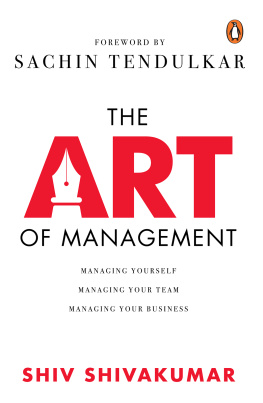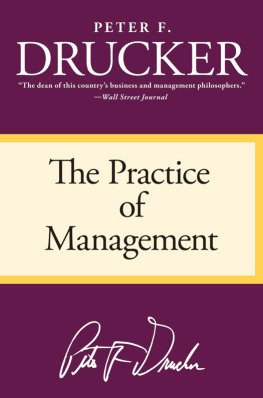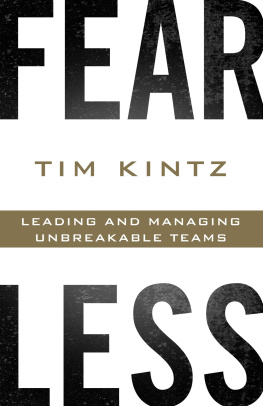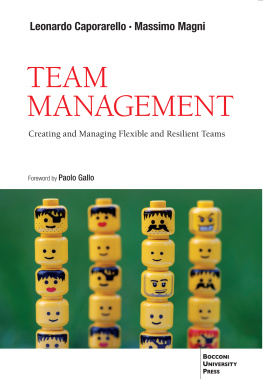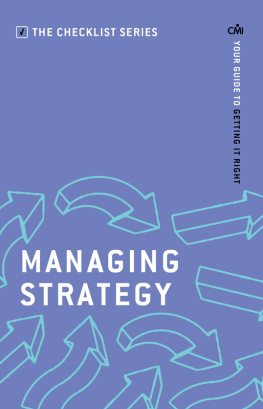Shiv Shivakumar, or Shiv, as he is popularly known, is one of Indias longest-serving CEOs. He is currently the group executive president at Aditya Birla Group. He has worked across multiple industries and categories, and has handled over sixty brands in his career. He was the CEO for Nokia in India and subsequently led the companys emerging markets unit. He was also the chairman and CEO for PepsiCo South Asia. He is ranked among Indias leading management and leadership thinkers and speakers. He is the author of the bestselling The RightChoice, which was published by Penguin Random House India in 2021.
Foreword
I have known Shiv for many years now. We have met at the sidelines of sporting events and brand launches. He has led diverse businesses and teams, and brings in a wealth of experience. When Shiv told me that he was writing a book about team management and self-management, I thought it was apt. Youngsters can learn from his knowledge and experience accumulated over the years.
As a prelude to the book, Shiv asked me to pen down my thoughts on various aspects. Having played a team sport all my life, I reflected on the following subjects. Shiv, I am sure, has covered these topics in detail through the book.
Discipline and Managing Ones Emotions
To manage oneself in all aspects of life, one needs discipline. I attribute my early discipline to my brother, Ajit. He taught me that discipline comes from paying attention to smaller things, like packing my cricket kit carefully and ensuring that my clothes and cricket gear were clean.
Discipline knows no boundaries, whether its the professional sphere or the personal sphere. Its either there or it isnt. As an analogy, think of a tree: the visible, beautiful parts of a tree are its branches, leaves and flowers, and one is tempted to water them. But its roots are the key; without the roots there is no branch or flower. If you want your tree to grow and blossom, you need to take care of the roots.
Managing Expectations
Expectations are a result of ones actions and track record. When one has done good things or achieved something in the past, it is natural for people to expect more from one. In fact, I would feel bad if people did not expect anything but the best from me. As a professional in any sphere, it would be odd to experience indifference to you or your work. Expectations motivated me; they gave rise to pressure, but pressure need not be construed as negativeit can spur you to do better.
If I ever imagined the weight of a billion people on my shoulders, I would have probably collapsed. But that was not how I saw it. I saw the collective force of a billion people behind me, pushing me forward. What can be more motivating and helpful than a billion-plus Indians propelling me towards my teams goals and my goals?
Handling Criticism
Criticism is a part and parcel of life. One must be open to constructive criticism. We tend to label people, and hence we notice the label first and then the suggestion. I never put a label on anyoneex-cricketers, journalists, commentators or even my fans. I just saw them as people who were giving me feedback. Believe it or not, it was a waiter at a Chennai hotel who told me that my armguard was coming in the way of my free bat swing! I accepted his feedback, reflected on it and took some corrective steps, and it helped me.
At the same time, one must know how to move on from discussions about the past. My motto was, Its the next ball that matters. Imagine you are a batter and there are two balls coming at you at 140-plus kmph. One is from the past, something that disturbed you, and the second one is from the real world. If I have to score runs, I have to live in the real world and face the real ball. Therefore, I had to train my mind to forget the past.
Adapting to the Times
Change is a constant in all aspects of life. If I look at cricket, it has changed massively over the years, and to thrive one has had to adapt. The key to adaptability is acceptability. If your mind cant accept the changes, then it wont let the body adapt to newer environments. Once I accepted the changes, I also made it a point to enjoy them. One must be comfortable being uncomfortable. Whether it was a new format, newer conditions or a new mystery bowler, I enjoyed being challenged. I saw everything different as an opportunity to learn something new, and I believe learning should never stop.
When talking to young cricketers, I emphasize the importance of getting the basics right. If the foundation is strong, you can add any number of floors to a building. Similarly, one can adapt to newer formats of cricket, provided the basics have been mastered. If you learn to bat, you can bat anywhereTests, ODIs or T20. However, if you get carried away and learn to hit T20 shots alone, then your success may be short-lived, and you will not be in a position to prepare yourself for any innovative formats.
Sometimes people tend to think of technique as limiting and orthodox. However, true technique liberates you and prepares you to adapt and win.
On My Second Innings
Who I am today is because of the unconditional love this country has provided. I will always continue batting for India. Giving back to society forms a key part of my second innings. There is a lot that can be done for our childrenthey are our future. The work being done by my foundation shall, hopefully, speak for itself in the years to come.
We are one of the youngest nations, but not the fittest. Transforming India from a sports-loving nation to a sports-playing nation, by partnering with like-minded stakeholders, has been another focus.
Brands are part of modern culture and have a key role in shaping society too. Partnering with purpose-driven brands, which impact society positively, is very satisfying. My team and I are also excited about technology and what it can do to make life better. I work with technology start-ups and am inspired by the innovative solutions that young entrepreneurs are bringing to the table.
Advice for Youngsters
Irrespective of which profession you are in, never get intimidated by seniors. Always make it a point to share your ideas with the rest of the team and never be afraid of being ridiculed. When you speak your mind, people appreciate the value you bring to the team. I was the youngest member when I joined the team, but I always made it a point to share what I was thinking with my teammates, seniors and captains.

